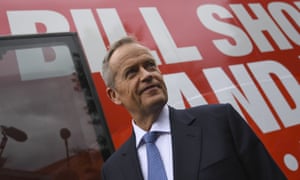Extract from The Guardian
Recent history shows us how a leader comes to power sets the parameters for the success or failure of their government
In the three major public opinion polls – Guardian Essential,
Newspoll and Ipsos – Labor remains where it has been for the last three
years – in front of the Coalition.
Leading the national contest for an entire parliamentary term is a substantial positive poll trend that suggests Bill Shorten is likely to win on 18 May.
But while Labor is in front, and remains the clear favourites as Australians race in record numbers to lodge pre-poll votes, the contest has not turned decisively Shorten’s way. If anything, the recent trend points to a slight narrowing in the Coalition’s favour, although this is a margin of error movement.
The question all along, since Scott Morrison fired the starter’s gun in April, has been whether this federal contest will be like the Victorian state result, where there was a decisive swing to Labor in the final week, or more like New South Wales, where different things happened in different parts, and the outcome was the incumbent Liberals held government.
The federal contest remains difficult to read. The off-the-buses field work undertaken by Guardian Australia during this campaign reveals one constant: considerable dissatisfaction on the ground, with both the major parties copping some of the anger.
This week’s Guardian Essential poll points to a drop in the primary
votes of Labor and the Coalition, and a rise in the Green vote and a
slight movement in Pauline Hanson’s favour. This suggests we are heading
towards something more like the NSW case study, but before we all get
carried away with this thought, last week, things moved in the other direction, with improvements in the primary vote for the Coalition and Labor.Leading the national contest for an entire parliamentary term is a substantial positive poll trend that suggests Bill Shorten is likely to win on 18 May.
But while Labor is in front, and remains the clear favourites as Australians race in record numbers to lodge pre-poll votes, the contest has not turned decisively Shorten’s way. If anything, the recent trend points to a slight narrowing in the Coalition’s favour, although this is a margin of error movement.
The question all along, since Scott Morrison fired the starter’s gun in April, has been whether this federal contest will be like the Victorian state result, where there was a decisive swing to Labor in the final week, or more like New South Wales, where different things happened in different parts, and the outcome was the incumbent Liberals held government.
The federal contest remains difficult to read. The off-the-buses field work undertaken by Guardian Australia during this campaign reveals one constant: considerable dissatisfaction on the ground, with both the major parties copping some of the anger.
While a substantial majority still predicts victory, Labor supporters are less confident than they were a week ago that Shorten will bring the contest home. More than half the sample as a whole, 54%, think Shorten will defeat Morrison, which is down five points from the expectation a week ago – and 90% of Labor supporters are punting on victory, down from 95% last week.
But when you look at the news stories commanding voter attention, last week was predominantly about the dumped candidates – a noisy parade of casual prejudice, lewdness and administrative incompetence that drowned out other messages.
Shorten noted at one point late last week that he hadn’t won the contest and hadn’t lost it – which looks to be the correct diagnostic.
Morrison’s entire re-election campaign is structured around warning voters about the risks of change, which is all about trying to prevent the Victorian scenario, the late decisive swing in Labor’s favour. The containment strategy isn’t delivering a decisive positive turn for Morrison and the Coalition, but it looks to have had some success stopping the Labor campaign from gathering lethal steam.
The open question is will Shorten, assuming the current trajectory is maintained, with no left-field events or monumental cock-ups, be able to break the Morrison containment line sufficiently to trigger a decisive movement in Labor’s favour over this closing fortnight?
Labor’s campaign launch on Sunday was all about telling the voters to switch on, and making the case for why the direction in Canberra had to change, and that switch on now call to action will be backed in when the advertising money is turned on for the closing stretch.
If it’s to be victory for Labor, Shorten, having taken all the risks, will want positive affirmation, because recent history shows us how politicians win is important to the ultimate success or failure of their governments.
Julia Gillard struggled because of how she got the job. Tony Abbott struggled because he was an unpopular leader who declined to share his real policy agenda with the public before he took office. Malcolm Turnbull was tin eared about the public mood in 2016, selling ebullience when voters were anxious. While voters don’t seem to be blaming Morrison for how he took the prime ministership, he struggles with the dead weight of the Coalition’s record.
So if Shorten wins, he will want the public to chose Labor rather than settle for Labor as the lesser of two evils. But at the end of the day, either of these two party leaders – Shorten or Morrison – will be content with winning on 18 May, however that happens, by attrition or by acclamation.

No comments:
Post a Comment